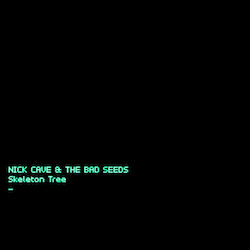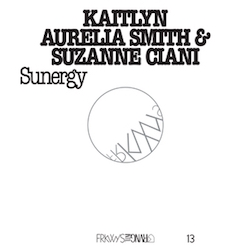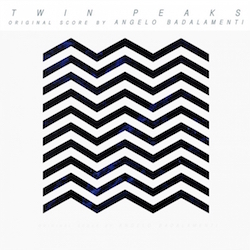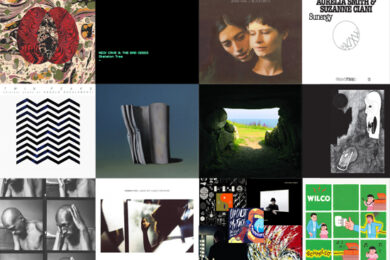On the seemingly never-ending conveyor belt of new music released each month, it’s easy to take individual works for granted; to allow your eyes and mind to wander safe in the knowledge that any wheels which need to turn are doubtless turning in absentia. And yet, albeit briefly, when they stop at the end of each period and there’s time to sort through the sonic mountain that has undeniably accumulated there is almost always – as the saying goes – gold in those hills.
With this in mind, though we push ourselves to rake the farthest reaches of the sonic spectrum with the finest tools imaginable, there is always room for error in the hands of those doing the raking. This column, as it has been for the last few months, then, is our chance to redress the balance — to highlight that which we’d missed and ought not to have, and to atone for our mistakes in writing.
The Caretaker – Everywhere At The End Of Time
It’s a bit of a con talking about Everywhere At The End Of Time, stage one, on it’s own. Leyland James Kirby is finally calling time on his musical alias, The Caretaker, which he began in 1999. Inspired by the final seconds of The Shining and the soundtrack to Pennies From Heaven he took pre-WWII big band swing music and processed it to create a “haunted dancehall” ambiance. The project took on a different tone in 2005 when he released the 72-track collection, Theoretically Pure Anterograde Amnesia and began to explore different concepts of memory loss via his music. Now he has one last job – to give the project itself dementia over a period of three years and six albums, with the music (not just from this album or the tracks he’s yet to write and record but from the entire project) being dragged into confusion and finally into the void. This is the first stage, which he has described as “an old person daydreaming” and is relatively upbeat. When it’s all over in 2019 is this how we will struggle to remember it… in happier times? Whatever transpires, it’s a fascinating project. John Doran
The Other Without – The Other Without
(Heavy Rural)
Rural England, we have to hope, is full of people like Neil Mortimer and Michael J York, AKA The Other Without, going about their daily business before going home, drinking strange teas and donning robes of ancient cloth to summon the land into unusual, transcendental music. Mortimer and York have pedigree with this sort of thing after all – the former has collaborated with Julian Cope while York builds his own pipes and other instruments, having blown them with Coil, Cyclobe, Urthona and The Stargazer’s Assistant (who themselves have an excellent album out that Russell Cuzner reviewed in Rum Music here).
The Other Without, though, is a far different beast: three sumptuously evolving tracks made from old synthesisers perfectly meshed with field recordings of water, birds and leaves – these, we are told, were "made at magical confluences, hidden waterfalls and enchanted shores". The result, recorded under the watchful tower of Glastonbury Tor, is absolutely fantastic to write to, or to take up to rolling downland as the autumn sky rolls into fire and the hollows in the slopes fill themselves by drinking deep of the night. ‘The Ocean Is Indiscrete’ sounds like universe-weary visitors from another dimension landing on a Dorset beach after a voyage of a length beyond our comprehension. ‘Earthstar Transmitter’ follows on by eddying the synths like waves stroking back the sand and pebbles unto the end of time before a quietly determined rhythm gradually appears, and a simple piano refrain. Water, wobble and pipe ruminations characterise the final part of this otherworldly, meditative gem of a record. Luke Turner
Hannah Peel – Awake But Always Dreaming
Given that the number of people living with dementia is rising exponentially (850,000 people in the UK currently have the condition, with the number set to hit 2,000,000 by 2051), that it should be a prescient topic for representation, exploration and sublimation by artistic process is hardly surprising. Spotlighting Hannah Peel’s second solo full-length album, as well as first part of The Caretaker’s Everywhere At The End Of Time, may seem like heavy going — bleak as it may seem, however, it’s an important reflection of our present reality.
But there is respite: Awake But Always Dreaming is considerably more (and, in fact, nothing like) a blunt instrument for delivering an important message. Far from the grim haze it’s easy to expect, all things considered, it’s a record of strange beauty and almost childlike euphoria from the outset. The precipitous synth of ‘All That Matters’ is joyous in the most cinematic of sense: the sound of a fleeting and precious moment in a time when rain was warm – or it didn’t matter if it were cold – and refracted the sun in all directions, like tumbling prisms. Conjuring these images – the kinds of memories we all possess, despite never having lived them – Peel reminds us of the way in which a life is something accumulated as much as experience, and of what can and cannot be lost in the face of a dehabilitating disease.
It’s with these accents – elegant, flick of the wrist movements – rather than in grand narrative gestures that Awake But Always Dreaming asserts itself. ‘Octavia’, with its hisses of static, manages to be both complex and spacious simultaneously, mirroring a kind of sodden yet frenetic thought process – a sense of being surrounded by images, knowing (from only the timbre of Peel’s voice) that so many of them are beautiful, but finding them as easy to discern as it is to grasp the haze that obscures them. It’s a powerful album that, both, gives a great deal – autobiographically, too, as the concept itself coming from experience with her grandmother’s condition – and asks almost as much, pushing us to reconsider presuppositions and, in the face of that, face up to a new reality of a very real situation. Karl Smith
Wilco – Schmilco(dBpm Records)
There’s an argument to be made for Wilco increasingly becoming masters of concision. This is the band whose second album was a double and who routinely made LPs knocking at the hour mark, now putting out records – this and last year’s Star Wars – that are just over half that. This feels like the end result of canny-eared reduction, following the formula of each record being a kind of folding-in of what came before into ever more compact constructions; the work of a band who know their sound inside out. And Schmilco is just that.
Jeff Tweedy’s knack for writing lyrics that couldn’t fall out of anyone else’s pen lies in images like ‘Normal American Kids’’s, “Empty summer days/ Lightning crazed and cracked like an egg/ High behind the garden shed” and ‘If I Ever Was A Child’’s jumping to jolt “clumsy blood”, while Nels Cline’s quietly screaming guitar and Mikael Jorgensen’s pitch-perfect organ lines invest songs that could have populated Being There with some of the expansiveness and weirdness of their later work. The mid-album highlight ‘Quarters’ just about gets it in one: it starts out as a fingerpicked barroom sketch before morphing, through a quick glance at krautrock-y rhythmic propulsion, into a dustbowl slide-guitar outro, an epic in miniature encased in less than three minutes. Laurie Tuffrey
Julius Eastman – Femenine
(Frozen Reeds)
Rather a very long piece of music than an album, the story behind the Helsinki-based Frozen Reeds label’s latest release involves a tragic tale of homelessness at the time of the death of its composer in 1990, with Eastman’s work laying long forgotten in the period that followed. This recording of ‘Femenine’, lovingly reissued in 2016 by Frozen Reeds, as performed by the S.E.M. Ensemble in 1974, with Eastman on piano, is the only known recording of the work in existence and finally shines a light on an extraordinary, and rather controversial, composer. As an out, black man in the 1970s he had found himself unable to identify with many of his peers – particularly John Cage, whom had grown angered by some of his actions. Eastman soon relocated to New York leaving behind much of the traditional classical music world, working at one point with Arthur Russell as well as many others, before his career ground to a halt in the mid-1980s.
‘Femenine’ gives us an insight though into his early works and into his relative attempts to break with tradition, its parts broken down by timings according to each section rather than following expected time signatures. A few introductory minutes of sleigh bells gradually develop into a simple, yet beguiling vibraphone pattern as more and more members of the ensemble join proceedings, adding layer upon layer to glorious effect, continuing this way for sometime over an hour. One would expect the repetition for such a length of time to grow somewhat jarring, and yet the timing of each additional instrument and layer only makes it more and more hypnotising, and curiously uplifting. There’s no record of quite how many performers and which instruments exactly were involved in the performance captured here so as each loop unfurls, you can perhaps let your mind make up what exactly it is that you’re listening to. Christian Eede

Suzanne Ciani & Kaitlyn Aurelia Smith – Sunergy





Tracks of the Month
Cakes Da Killa ft. Peaches – Up Out My Face
Leonard Cohen – ‘You Want It Darker’
Sleaford Mods – Total Control Racing
Bruce – ‘I’m Alright Mate’
Bon Iver – ’33 GOD‘
G.H. – ‘Packhorse’
Hannah Peel – ‘Octavia’
Jason Sharp – ‘A Boat Upon Its Blood Pt. 1’
Stars Of The Lid – ‘Twin Plotkin V2’



